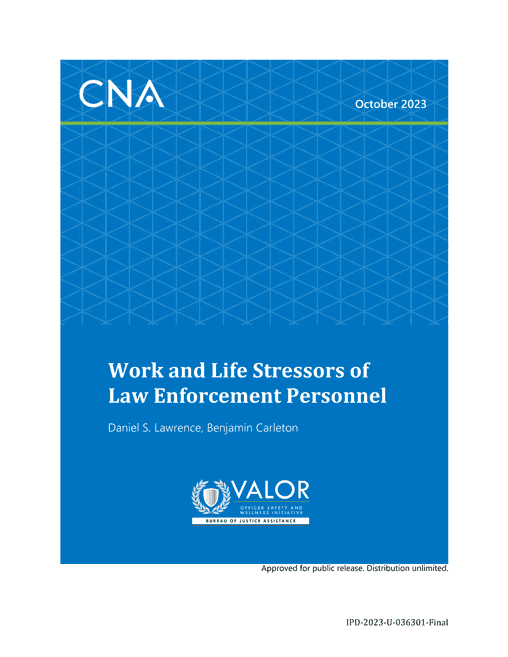Policing is widely considered to be a stressful profession, particularly compared to other occupations (Acquadro Maran et al., 2022; Adams & Buck, 2010; Dick, 2000; Gershon et al., 2009; Purba & Demou, 2019; Violanti & Aron, 1995; Zhao et al., 2002). Police stress has received considerable attention in the existing academic literature, and the passage of the Law Enforcement Mental Health and Wellness Act of 2017 renewed calls to support officer health and wellness, which has brought the topic to the forefront of conversations surrounding policing in the United States.
This brief describes the results from a single question in the CNA Corporation’s (CNA) survey among nine law enforcement agencies, deployed around February 2023. The open-ended question asked sworn and professional respondents to “Please describe what causes your mental and emotional health to deteriorate in life and at work.” Out of the 1,304 individuals who participated in the survey (representing a 9.0 percent response rate), a substantial 993 respondents (approximately 76 percent) provided written responses to this question. This significant engagement underscores the evident importance of the topic to law enforcement personnel.
We systematically reviewed the open-ended comments and identified 37 unique issues that were categorized into six broad topic areas, which encompassed stressors related to leadership and supervision, workplace stress, workplace culture, personal life stressors, mental health issues, and challenges associated with public support. The results are organized by ranking individual issues within topic areas, as well as detailing differences across demographic and position characteristics.
Results indicate that agencies have direct control over many areas that could reduce staff stress. Such improvements include the development or updating of policies to enhance work-life balance, which not only prevents staff from becoming overburdened during duty but can also potentially boost morale and reduce overall work-related stress. In addition, implementing comprehensive training programs for new supervisors or offering annual in-service management training can be instrumental in ensuring managers possess the skills to establish clear expectations and foster an environment of trust, thereby alleviating any sense of micromanagement among staff. These changes can enhance workplace culture and promote positive interactions among colleagues.
Download reportApproved for public release. Distribution unlimited.
Details
- Pages: 26
- Document Number: IPD-2023-U-036301-Final
- Publication Date: 10/10/2023
